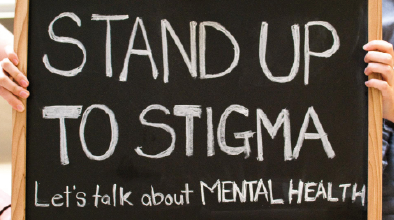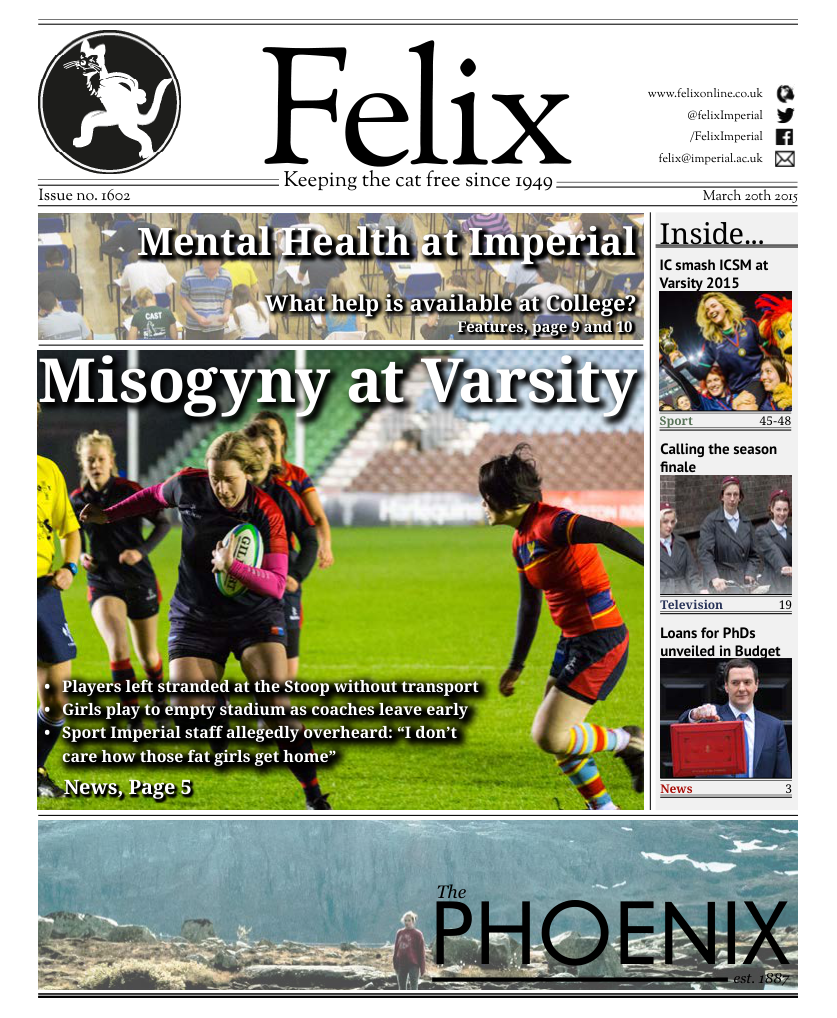What does it mean to have a mental health problem at Imperial?
George Butcher investigates what you can do if you need help

If you have 400 Facebook friends aged 16 to 24, the chances are that 14 of them have generalised anxiety disorder, 35 of them have self-harmed and 24 of them have attempted suicide. Over our life time, a quarter of us will suffer from a mental health problem.
Felix has investigated what it means to have a mental health problem at Imperial. We’ve interviewed several students who have used the system, and also to members of staff who provide help in one form or another. Based on students’ experiences, we’ve followed the route they might take through Imperial’s support system.
The front line of help is the personal tutor. In most departments, every academic and some post-docs are expected to take this role. Some students we’ve spoken to found their personal tutor incredibly supportive; others said they didn’t know them; and others that they were actively unhelpful. Although new personal tutors receive training, long-standing tutors often rely purely on past experience. Whilst the vast majority of personal tutors are extremely helpful, they still need support too.
Often a personal tutor will direct a student to the student counselling service. It’s a confidential service provided free to students – and we have heard of people who had a very good experience, but also from those who didn’t benefit from counselling. It’s not for everyone and shouldn’t be seen as the only option.
Every student we spoke to had visited the Imperial Health Centre and for most, it was the turning point in their experience. Whilst NHS operated, it receives funding and support from Imperial. The GPs are recruited specifically because of their expertise in working with young adults and are equipped to diagnose your problem and refer you to appropriate treatment, be it Cognitive Behavioural Therapy (CBT), psychoanalysis, counselling or something else.
The funding of the health centre is currently under review for the first time in eight years. It is vital that it is given continued support and its unique position to help all students here is recognised. Students we spoke to who had to move to a different GP surgery after graduating found the new treatment was lacking.
It’s getting closer to exam time – this is the point when students are most at risk. Imperial’s examination system is not best set up for ill students. Whilst it’s possible to resit an exam you fail whilst ill, if you sit an exam and pass, even if by a small amount, it’s not possible to resit that exam without retaking the entire year. This places an added stress on students; should they sit the exam anyway and hope they do ok or drop out and try again in September? Registry should allow students with a known problem to resit exams in September, even if they passed the first time.
Often students turn to the Union’s Advice Centre. Run by staff, this is a useful service for students to get impartial advice when their department can’t help. However, despite having a Deputy President for Welfare, and welfare representatives in every constituent union (CGCU, ICSMSU etc), no students are given any formal training. This is a missed opportunity to create a peer support network.
There are many people doing good work at Imperial, be it at the counselling service, the health centre or academic departments. But there is room to improve still. Personal tutors should be encouraged to take up more training. The Health Centre and the Counselling Service need the support to run the services they provide at minimal waiting times. Registry should change the way it treats ill students who sit exams anyway, rather than needlessly adding more stress or pressure at a time when it is most unhelpful. The Union should continue its good work at the advice centre, but should also make an effort to train its student welfare representatives.
Our mental health is something we all have a part in, and weshould all – students, staff and academics – continue to improve one another’s.
Is there a mental health stigma? _Felix _asks students:
We found strong signs of a stigma around mental health problems here at Imperial – which is daft because so many of us suffer from them. “The main problem is lack of awareness and students’ lack of willingness to talk about it,” said one student.
A quarter of people suffer from a mental health problem in their life-time. Since you’re most likely to do so when you’re young and under stress, there’s no doubt that many people you know here suffer from one, even if you don’t yourself.
“There is a stigma, it’s why I won’t admit it openly... given how competitive people are in my year, I think they’ll see it as a weakness.” This is a common problem faced by students, but particularly men. For example, depression affects both genders equally – but 75% of suicides are men. Another student said, “I didn’t speak to many people, my flat mate and my parents, I was embarrassed... My parents know, my sister knows, my boyfriend and a couple of my friends”.
People who are not well shouldn’t have the additional stress of how society around them judges them.
Reducing stigma is a big part of the ‘Mentality’ campaign (a Union initiative) – but it’s something we should all play our part in. “Educate yourself” was a simple solution offered by one student. It’s not hard to learn a bit about common mental health problems. Don’t look down on it and be supportive to someone who comes to you. If someone’s brave enough to talk to you about their health, respect them for it and take them seriously.
It’s not easy to bring up someone’s health. One student said, “even now I recognise symptoms in other people, but I can’t talk to them about it... I find it difficult to bring up even if I know they’re struggling”.
Be brave – talk about mental health.
Health Centre
Every student we spoke to had used Imperial Health Centre at some point in their journey and their experiences were all positive. However, there are concerns that the relationship between Imperial and the Health Centre could be weakened.
Having a health centre closely linked to the University is a huge advantage. They are able to work closely with the counselling service and the disability advisory service to get students to the right help quickly.
They’re used to Imperial students with mental health problems; a GP we spoke to had seen six new students with a mental health problems that week alone. They have existing links with Imperial’s senior tutors, and know who to speak about a particular students’ needs. It makes absolute sense for this service to be linked to Imperial.
Imperial funds the health centre so that it’s able to treat all Imperial students, not just those who live outside of its NHS catchment area. However, a recent College review recommended that students see GPs local to their area. It remains to be seen if this recommendation will be adopted.
This would be extremely bad for students’ welfare. Students living further from Imperial are more vulnerable by the nature of being further out; and this will be more relevant when 650 freshers move into North Acton next year.
Every student we spoke to who had received treatment both at the Health Centre and at other GP surgeries found the help at Imperial vastly better.
One student said, “I was in Battersea – I took two months to get CBT... I went to the health centre to see a GP and it was much quicker, three or four weeks.”
Another said, “I moved out of the London jurisdiction and had to redo the process... it was then a complete nightmare”.
Our investigation would challenge the recommendation that students are better getting treatment elsewhere. Mental health treatment is not equal across NHS surgeries and all students deserve equal access to treatment irrespective of where they live.
Counselling Service
The counselling process invites you to discuss any issue troubling you with someone trained to listen and respond to you. It gives people the opportunity to air problems that till then have been stuck inside them. There’s nothing you can tell them they haven’t heard before.
One student told us that when they went, the service was “a huge help”. However, by its nature, counselling doesn’t provide practical advice. This can sometimes be frustrating, one student said, “they told me that my problems were too big for them to handle”. It’s important that the counselling service works with the health centre to help all students.
Last year they saw 540 students, which was an increase of 6.7% the previous year. College is responding to this need; the counselling service tell us they’re hoping to increase the number of appointments and decrease their waiting times.
College is expanding the role of the counselling service to also provide ‘mentors’ who can give students practical advice to deal with problems. This will take effect next academic year.
Advice for other students
We asked students we met what advice they would give to other students in similar situations to them. The overwhelming opinion was that whilst, “when you are depressed, it’s easy to feel that there’s nothing that can be done”, it was important to realise that this wasn’t the case.
The stigma around mental health makes it harder to come forwards. “It’s hard to talk about it – it’s really competitive – makes you feel weak, that you can’t handle it like everyone else”. One student said, “The main problem is lack of awareness and students’ lack of willingness to talk about it”. Breaking through this stigma and telling someone about your problem is the hardest part. But when people did, it undoubtedly helped.
A recent graduate said to, “Talk to people, definitely someone academically. I’d also talk to some of your friends.” Speaking to friends can be difficult; it’s difficult to know how people will react and sometimes it’s not the reaction you want. One student said, “I was sleeping loads, I was self harming... it was a pretty horrible time but I managed to hide it from everyone, it came as a shock when I told some of my friends.”
They told the story of when they spoke to their new partner, “someone asked me out – I panicked and said yes... spent the whole day worrying I had to tell them... ended up blurting it out... it was horrible, but incredibly helpful”. People around you may also be able to give you advice, “my boyfriend suggested I go to the doctor so I went to the health centre... I saw the GP there who was fantastic”.
Academic departments
“[Revising was] the first time I thought of dropping out of university – but my personal tutor was very supportive, the undergraduate department was great”.
Departments play a big part in our mental health. Often the triggers come from a student’s degree, and the senior tutors and undergraduate offices are very experienced at helping students with problems.
Speaking to a personal tutor was for many a surprisingly positive experience. Others hadn’t built a relationship with their tutor so they spoke to the senior tutor or another supervisor. It’s important to remember that since mental health problems are so common at Imperial, the departments have a huge amount of experience helping (yes, genuinely) helping students like you.
“Tell the department – they can do so much more than you think” said one student, “the department are experienced, you’re not the first person to have problems” said another.
Sadly not all personal tutors are as helpful as they could be, “I think I’ve been quite lucky with a personal tutor... a friend’s tutor just asked a group “so is anyone considering suicide?”” The senior tutors in particular are well supported by the other services at Imperial. “I was never expecting a shoulder to cry on – but [my personal tutor] was good to get direction from”.
The departments are of course crucial to speak to at exam times. If you sit an exam and pass it – even if only just and you have an extenuating circumstances – it’s not possible to resit that exam without retaking the year. This is unfair and puts an un-needed stress on students at exam times.
One student we spoke to sat their exams after being persuaded to do so by their department. “I cracked on the first day [of exams], I wanted to drop out of the year, it took a lot of persuasion to get me to not do that... Very last minute they got me a room to myself... I took all my exams in solitary... the exams were shit – but I passed every single one! (Well apart from one)”. Of course they hadn’t done as well as they deserved and went on to retake the entire year, but taking them had nonetheless helped at the time.
Departments don’t always work, in which case the College Tutors are the best place to turn as they are external to the department. Every student we spoke to did have a positive experience from them.










